Over 400 people from four countries gathered in Chicago to chart the next steps of the queer health movement at Through the Life Course, the LGBTI Health Summit from Aug 14-18. The hallways of the Chicago Hilton were bustling with energy and ideas — a testament to the resilience of queer wellness advocacy in the face of ongoing economic and political challenges, say organizers.
“It demonstrates the interest and passion our community has for improving LGBT health and the importance of coming together to move forward locally and internationally,” according to organizer Catherine Jefcoat. The inclusive, volunteer-run event was “truly an incredible experience,” says Jefcoat, who is director of the Lesbian Community Care Project at Chicago’s Howard Brown Health Center.
A key strength of the summit, according to co-organizer Jim Pickett of the AIDS Foundation of Chicago, was the commingling of veteran activists with fresh blood. “I was privileged to witness the renewal of long-standing connections as well as the birth of new ones, sharing in the sparks, the powerful current of community organizing and strategizing,” he says.
Over the course of the five-day event, the topics under discussion ranged from understanding substance use among homeless queers to providing new research on HIV prevention technologies, from tackling the barriers to providing effective health services to trans people to using social media for queer and feminist health organizing.
A full day was devoted to health issues facing bisexual men and women, including the impact of stigma on bi health and wellbeing, and the impact of biphobia within and outside of queer communities. Presenters included Torontonians Cheryl Dobinson and Loralee Gillis, who revealed the findings of a study on bi mental health conducted by the Centre for Addiction and Mental Health (CAMH) and the LGBT program of Sherbourne Health Centre.
There was a very strong trans presence in the programming over the course of the weekend, but despite the representation of intersexed people in the summit’s LGBTI moniker, no sessions focused specifically on intersex issues. According to organizers, some leadership changes at American intersex advocacy groups may have played a hand. Still, says Jefcoat, “We can always do more work to build relationships with folks working on intersex issues.”
The theme “Through the Life Course” was reflected in number of seminars and presentations focused on the specific needs of queer youth as well as elders, including a session on aging and HIV, and a plenary on the pivotal role of intergenerational leadership. Building ties between older and younger queers “is not optional,” said speaker Chris Bartlett, an activist since the days of ACT UP.
“Each of us must be willing to claim our unique role in the movement, and share what we know with others of all ages,” Bartlett noted. Scout, a Rhode Island-based health consultant, added that all queers ought to develop relationships with people who are “over 60 or under 20,” and to cross identity barriers in doing so. “I think everyone should be raised by fags. I also think everyone should be raised female — it’s a great learning experience.”
The assembled group cheered Toronto’s Gillis when she told the story of how the Pussy Palace organizers successfully fought back against the police raid in 2000. The greatest allies of young sex-positive women were the older gay men who had been involved in protests against the galvanizing men’s bathhouse raids two decades before. “They understood us, and shared their wisdom with us,” said Gillis.
The summit concluded with a ritual conducted by Sister Glo Euro N’Wei of the local chapter of the Sisters of Perpetual Indulgence. Participants held hands in a circle and turned to one another to say “I love you, and I love the work that you do.” Presentations from the event will soon be available online at the summit’s website.

 Why you can trust Xtra
Why you can trust Xtra


